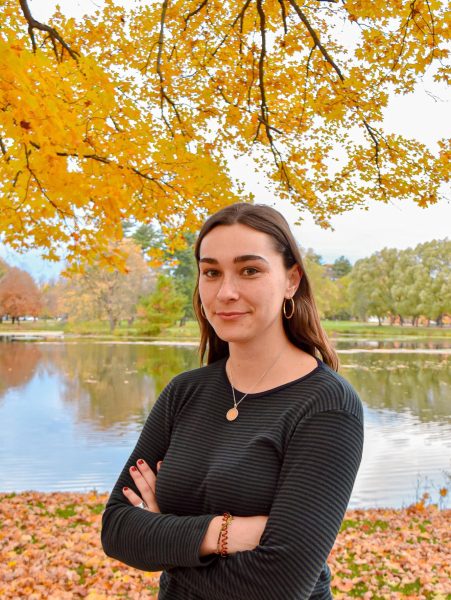Passionate Living: Theme Housing
Along Broad Street lies several unassuming structures central to Colgate community: theme houses. Theme housing at Colgate is a form of special interest housing in which students can build communities around shared traits or interests within the boundaries of University policy and practice. A few of the current theme houses include the Loj (70 Broad Street), the Sustainability House, Interfaith Social House (110 Broad Street) and the Pink Haus (102 Broad Street), the queer belonging house.
Senior Sebastian Coco, president of the Creative Arts House, further iterated that he believed theme housing was all about endowing passionate people and their fantastic ideas with the ability to construct their own living and learning space.
“The fact that students have the ability to manipulate their own space and manipulate their own community […] I think that’s the biggest strength of theme houses. Being founded out of university ideals, but really carried up, motivated and pursued by student interests,” Coco said.
In its inaugural year on campus, the Creative Arts House offers an environment that enriches both students and their ideas.
The Creative Arts House has some ambitious ideas for this year including an a capella group riff-off, a revitalization of Broad Street Records, and support for various emerging student bands. They are also looking to use their new state-of-the-art sound system and stage in New Brehmer Theater more extensively. All things considered, the intention is to cultivate an inclusive social space for students to feel connected to their community.
“Everyone’s really excited to actually engage with the whole campus in a way that most Broad Street houses could do, but haven’t been doing,” Coco said. “We’re in talks about giving theme houses a more equitable representation on Broad Street and kind of a bigger, more equitable piece of the social scene.”
In order to expand the reach of his community and cement the existence of the Creative Arts House for the next several years to come, Coco knows that more awareness about its presence as a social locale in the first place is certainly crucial.
Junior Raquel Marquez-Guerrero, a co-manager of La Casa Pan Latina-Americana, feels similarly. While La Casa has a longer and more storied history at Colgate than the Creative Arts House, its community has been disrupted in recent years by both the pandemic and the change to a new location. The focus of La Casa’s leadership has been to engage a diverse group of students to rebuild the community. The house has started a flag project to decorate the house’s common room, where each student living there gets the flag of their home country displayed.
“Our mission is multiculturalism and promoting and celebrating different cultures. We try to get a variety of people [to live here], so we’re trying to get whoever wants their flag represented to have their flag represented to fit the whole house,” Marquez-Guerrero said.
In some ways, though, Marquez-Guerrero finds the work needed to achieve her goals to be relatively light, as living in a theme house intrinsically produces a tight-knit community.
“I feel like every time I come down[stairs], I meet a new person,” Marquez-Guerrero said. “So I think having that house feeling is really real here. I didn’t have to do anything to create that; it kind of just happened naturally.”
Senior Rachel Pittman, president of the Afrikan Diaspora House, voiced praise for the quick transformation of her theme house into a genuine home. This phenomenon, Pittman believes, is unique to theme housing in comparison with the typical dorm scenario found up the hill.
“There are people who I had never met before this year who are some of my closest friends now, because of living in this house. Even those who I’m not particularly close with are very friendly. We all give each other a smile and a good morning when we run into each other to brush our teeth,” Pittman said. “You feel like there’s something that unites you and all your housemates, so even if you don’t know people in the house, it’s very easy to get to know people.”
In fact, that united feeling is the very foundation upon which the Afrikan Diaspora House is built.
“I think most of the residents of the Afrikan Diaspora House live there because they want to share a space with other people who understand the Black experience […] The Afrikan Diaspora House is a place where we don’t have to be educators,” Pittman said.
In the spirit of greater cooperation, each house also tends to work with an associated on-campus organization in a mutualistic relationship. For example, the African Student Union and Black Student Union might sponsor a party or social event at the Afrikan Diaspora House, using the House as a gathering place for their wider network; the same is true for the Latin American Student Organization at La Casa or the Creative Arts Society at the Creative Arts House. The result is to expand awareness of both connected organizations and foster a broader sense of belonging for all interested students.
In the end, Coco, Marquez-Guerrero and Pittman all stress that theme housing is bigger than just playing host to exciting and inclusive social events for Colgate students.
“In just a few words, really just one word, it’s about collaboration,” mused Coco. “This is where community can be built.”

Sophie Karbstein is a junior from Jupiter, Fla., concentrating in peace and conflict studies and Russian. She has previously served as Assistant News Editor....




